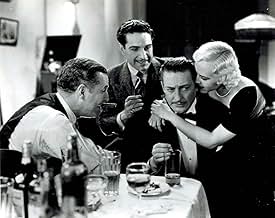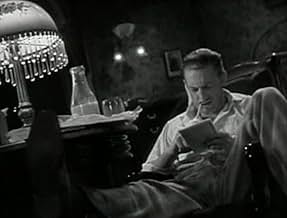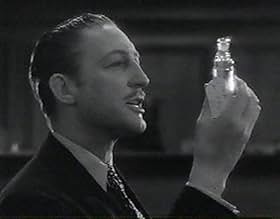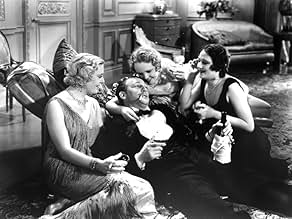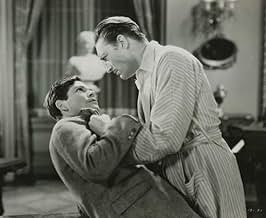Prosecutor becomes a defense attorney after an innocent man is sent to an electric chair.Prosecutor becomes a defense attorney after an innocent man is sent to an electric chair.Prosecutor becomes a defense attorney after an innocent man is sent to an electric chair.
J. Carrol Naish
- Tony Rocco
- (as J. Carroll Naish)
Berton Churchill
- Rocco Trial Judge
- (uncredited)
Davison Clark
- Detective Arresting Garland
- (uncredited)
Kenne Duncan
- Office Worker
- (uncredited)
Helena Phillips Evans
- Crying Prospective Client
- (uncredited)
Storyline
Did you know
- TriviaThe Vince Day character is very loosely based on Bill "The Great Mouthpiece" Fallon, one of the great criminal defense attorneys of the 1920s, who successfully defended gambler Arnold Rothstein in the "Black Sox" Fix of the 1919 World Series. Nevertheless, Fallon's daughter, Ruth, won a criminal libel judgment in a Syracuse, N.Y. police court, against the owner of a theater that showed the film. It was later overturned.
- GoofsJust as Vince's car drives off after picking up Celia during her last day, a lighting stand can be seen briefly across a doorstep.
- Quotes
Miss Hickey, Day's Secretary: It's all in the days work, said the street sweeper to the elephant.
- ConnectionsReferenced in Public Enemies: The Golden Age of the Gangster Film (2008)
Featured review
THE MOUTHPIECE (Warner Brothers, 1932), directed by James Flood and Elliott Nugent, does not pertain to anything regarding to the inventions of a smoking pipe, a telephone handset nor a component of a brass instrument. In fact, the term "mouthpiece" is a slang term for lawyer, a highly regarded role enacted by Warren William. Taken from the play by Frank J. Collins, the story scripted by Joe Jackson, is reportedly based on the life of William J. Fallon, a New York City attorney, but fiction or not, THE MOUTHPIECE is a perfect example of what extremes that any attorney would do to win both case and fame.
The plot opens in a New York City courtroom where Vincent Day (Warren William), an assistant district attorney, through his testimony, convinces the jury to convict Robert Wilson (Emerson Treacy) for "taking the life of an innocent girl." On the very night of Wilson's execution in the electric chair, Day is notified by District Attorney Forbes (Walter Walker) that Wilson innocent with the real culprit caught and arrested. Because he sent an innocent man to his death, Day drowns his sorrows drinking heavily in a bar where he's served by Paddy, an Irish bartender (Guy Kibbee) who convinces him to put his legalistic knowledge to work, and making more money in the process, by becoming a defense lawyer. Day soon accepts his new challenge working as a "mouthpiece" for mobsters. His first case finds him proving Pondapolis (Stanley Fields), a boxer, guilty by catching him off guard with one punch. He later rises to fame after getting Tony Rollo (J. Carroll Naish), an Italian mobster, off for poisoning an administrator. Having opened his own law office, Day acquires a personal secretary in Miss Hickey (Aline MacMahon), and Celia Farraday (Sidney Fox), recently from Riverport, Kentucky, as his stenographer. While Hickey is secretly in love with Day, his sole interest is on Celia. Unlike the other women from his illicit past, Day comes to realize Celia's loyalty to Johnny Morris (William Janney), the boy she intends to marry. Learning how her salary has come from Day's "blood money," Celia quits her job, agreeing to resume her position (at no salary) until Day is able to obtain another secretary to replace her. Some time later, Johnny, working as a bank messenger, is arrested on the charge of a $2,000 bond theft. Believing him innocent, Celia comes to Day for help, even at the possible risk of he endangering himself for going against his gangster friends.
THE MOUTHPIECE is Warren William's showcase from start to finish. A dress rehearsal for his latter attorney role in the short-lived "Perry Mason" film series (1934-36), many rightfully label his role of Vincent Day to be one of William's top screen performances, and naturally so. Aside from his astounding courtroom cases, it's hard to forget his underhanded method by getting Barton (John Wray), a bank cashier, off for embezzling $90,00 from his employer, Mr. Smith (Morgan Wallace) of E.A. Smith & Associates, then "earning" the remaining $10,000 of the bank's own money for himself; and swallowing an entire bottle of poison to prove his case in the courtroom to give the jury a reasonable doubt his client is innocent.
Supported by a capable cast of Warners stock players, including Berton Churchill (The Judge); Murray Kinnel (Thompson, Day's Butler); Mae Madison (Elaine); Ralph Ince (J.B); the mean-looking Jack LaRue (Joe Garland) and Charles Lane (Hotel Desk Clerk), only the pert and dark-haired Sidney Fox makes her loan-out assignment to Warners from her home-base studio of Universal. Fox, an interesting screen personality with a brief movie career (1931-34), is quite believable as the honest but naive Celia Farraday, down to her Southern accent. Also giving a commendable performance is Aline MacMahon playing another loyal secretary no different from her debut screen performance in FIVE STAR FINAL (1931) opposite Edward G. Robinson. Her sincere performance is the sort of role that remains in memory long after the film is over.
Remade twice by Warners, first as THE MAN WHO TALKED TOO MUCH (1940) with George Brent and Virginia Bruce; and as ILLEGAL (1955) with Edward G. Robinson and Nina Foch, the 1932 original, though virtually forgotten until resurrected during the early years of Turner Network Television (1988) followed by occasional broadcasts on Turner Classic Movie, has never been surpassed. In the Hollywood sense, pace is fast, story contrived but interesting, and conclusion quite suspenseful.(***)
The plot opens in a New York City courtroom where Vincent Day (Warren William), an assistant district attorney, through his testimony, convinces the jury to convict Robert Wilson (Emerson Treacy) for "taking the life of an innocent girl." On the very night of Wilson's execution in the electric chair, Day is notified by District Attorney Forbes (Walter Walker) that Wilson innocent with the real culprit caught and arrested. Because he sent an innocent man to his death, Day drowns his sorrows drinking heavily in a bar where he's served by Paddy, an Irish bartender (Guy Kibbee) who convinces him to put his legalistic knowledge to work, and making more money in the process, by becoming a defense lawyer. Day soon accepts his new challenge working as a "mouthpiece" for mobsters. His first case finds him proving Pondapolis (Stanley Fields), a boxer, guilty by catching him off guard with one punch. He later rises to fame after getting Tony Rollo (J. Carroll Naish), an Italian mobster, off for poisoning an administrator. Having opened his own law office, Day acquires a personal secretary in Miss Hickey (Aline MacMahon), and Celia Farraday (Sidney Fox), recently from Riverport, Kentucky, as his stenographer. While Hickey is secretly in love with Day, his sole interest is on Celia. Unlike the other women from his illicit past, Day comes to realize Celia's loyalty to Johnny Morris (William Janney), the boy she intends to marry. Learning how her salary has come from Day's "blood money," Celia quits her job, agreeing to resume her position (at no salary) until Day is able to obtain another secretary to replace her. Some time later, Johnny, working as a bank messenger, is arrested on the charge of a $2,000 bond theft. Believing him innocent, Celia comes to Day for help, even at the possible risk of he endangering himself for going against his gangster friends.
THE MOUTHPIECE is Warren William's showcase from start to finish. A dress rehearsal for his latter attorney role in the short-lived "Perry Mason" film series (1934-36), many rightfully label his role of Vincent Day to be one of William's top screen performances, and naturally so. Aside from his astounding courtroom cases, it's hard to forget his underhanded method by getting Barton (John Wray), a bank cashier, off for embezzling $90,00 from his employer, Mr. Smith (Morgan Wallace) of E.A. Smith & Associates, then "earning" the remaining $10,000 of the bank's own money for himself; and swallowing an entire bottle of poison to prove his case in the courtroom to give the jury a reasonable doubt his client is innocent.
Supported by a capable cast of Warners stock players, including Berton Churchill (The Judge); Murray Kinnel (Thompson, Day's Butler); Mae Madison (Elaine); Ralph Ince (J.B); the mean-looking Jack LaRue (Joe Garland) and Charles Lane (Hotel Desk Clerk), only the pert and dark-haired Sidney Fox makes her loan-out assignment to Warners from her home-base studio of Universal. Fox, an interesting screen personality with a brief movie career (1931-34), is quite believable as the honest but naive Celia Farraday, down to her Southern accent. Also giving a commendable performance is Aline MacMahon playing another loyal secretary no different from her debut screen performance in FIVE STAR FINAL (1931) opposite Edward G. Robinson. Her sincere performance is the sort of role that remains in memory long after the film is over.
Remade twice by Warners, first as THE MAN WHO TALKED TOO MUCH (1940) with George Brent and Virginia Bruce; and as ILLEGAL (1955) with Edward G. Robinson and Nina Foch, the 1932 original, though virtually forgotten until resurrected during the early years of Turner Network Television (1988) followed by occasional broadcasts on Turner Classic Movie, has never been surpassed. In the Hollywood sense, pace is fast, story contrived but interesting, and conclusion quite suspenseful.(***)
Everything New on Max in January
Everything New on Max in January
Looking for something different to add to your Watchlist? Take a peek at what movies and TV shows are coming to streaming this month.
Details
- Runtime1 hour 26 minutes
- Color
- Sound mix
- Aspect ratio
- 1.37 : 1
Contribute to this page
Suggest an edit or add missing content


